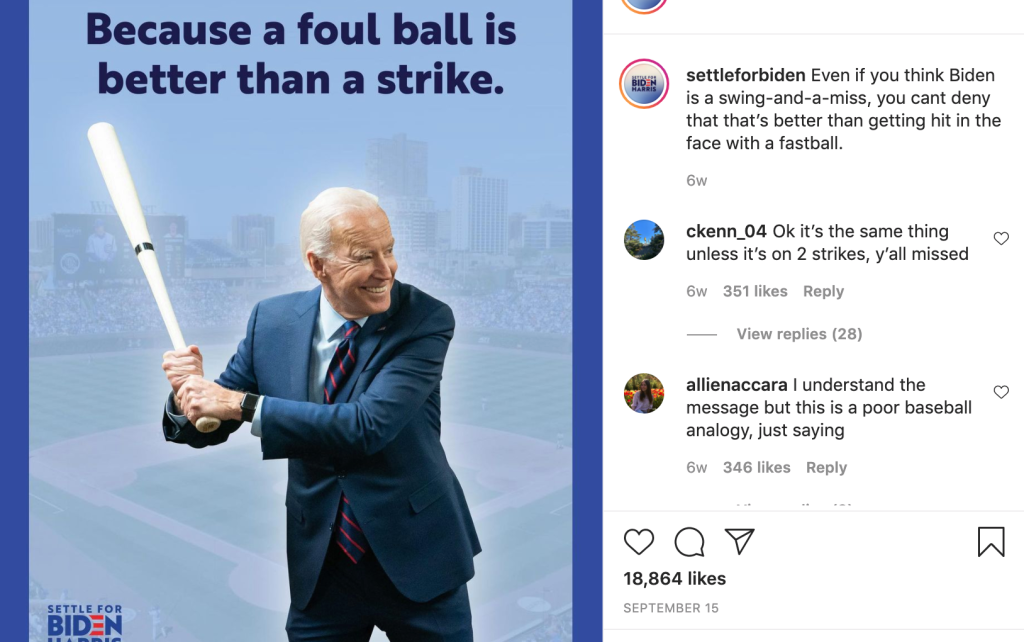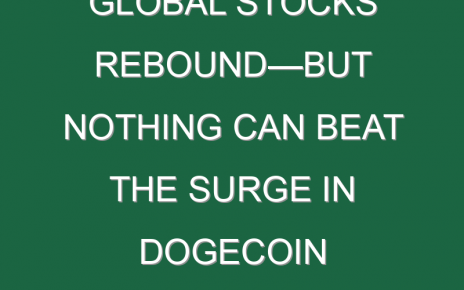When Vermont senator Bernie Sanders dropped out of the presidential primary in April, the assumed nominee, Joe Biden, made a direct appeal to his supporters. “Let me say, especially to the young voters who have been inspired by senator Sanders: I hear you. I know what is at stake. And I know what we have to do,” he said.
The appeal makes sense: While young people don’t show up to the polls as frequently as their elders, they now constitute about half of all Americans. One in 10 eligible voters are members of Generation Z (ages 18 to 23), and 27% of voters are millennials. Together, that’s enough to sway an election.
Voters between the ages of 18 and 44 were the largest demographic group to support Sanders over Biden during his Super Tuesday sweep last Spring. According to exit polls, Sanders won the largest chunk of voters 18 to 29 years old in every single state with the exception of Mississippi. And while it wasn’t enough enough to propel Sanders to victory, it’s an important group for any politician to hold on to.
Americans between the ages of 18 and 23 are likely to vote along the Democratic ticket Tuesday, but not enthusiastically. Nearly half of Gen Z voters say they’re casting their vote against Donald Trump—not in favor of Biden—and a quarter of young voters said that they didn’t like Biden or Trump enough to vote, compared with just 13% of the total population, according to a new POLITICO/Morning Consult survey.
Sam Weinberg, a 19-year-old Illinois native who backed Sanders, noticed this lack of enthusiasm in his own life. As Sanders winded down his campaign, Weinberg worried that his friends would also wind down their political activism. So he decided to do something about it. He created the Instagram account, Settle for Biden, which contains a healthy dose of tongue-in-cheek, self-aware humor alongside real policy comparisons between Trump and Biden. One image, which received nearly 20,000 likes, shows Biden holding a baseball bat with the words “because a foul ball is better than a strike.” The caption below it reads: “Even if you think Biden is a swing-and-a-miss, you can’t deny that that’s better than getting hit in the face with a fastball.”
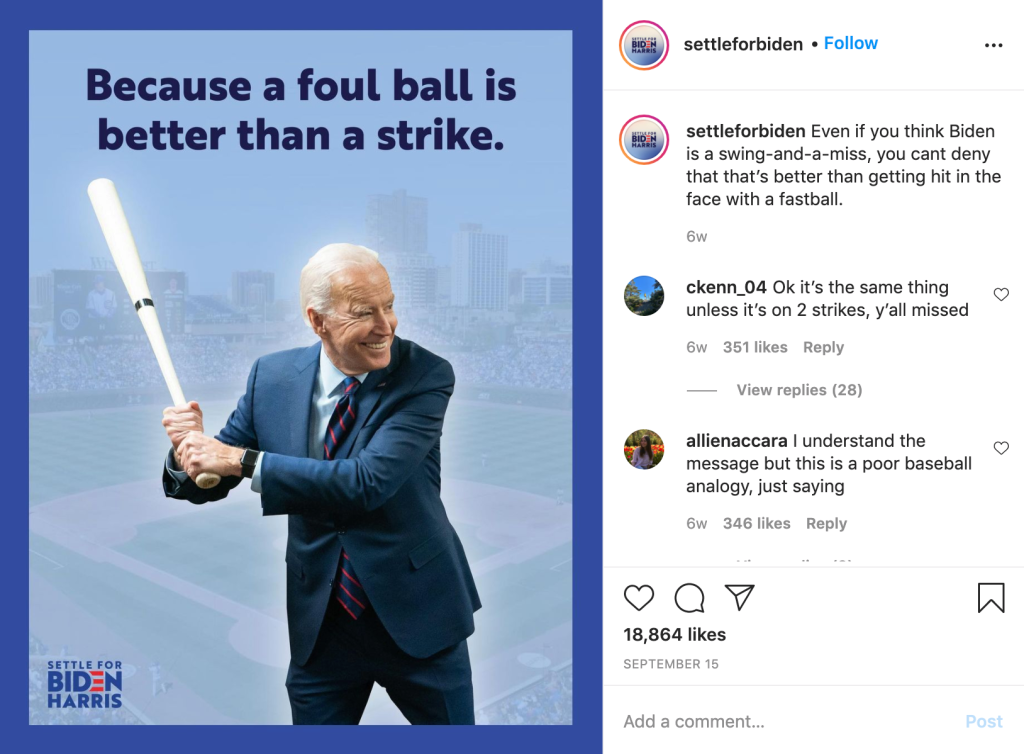
Another image features a photo of Biden with the words “he’ll do” above him.
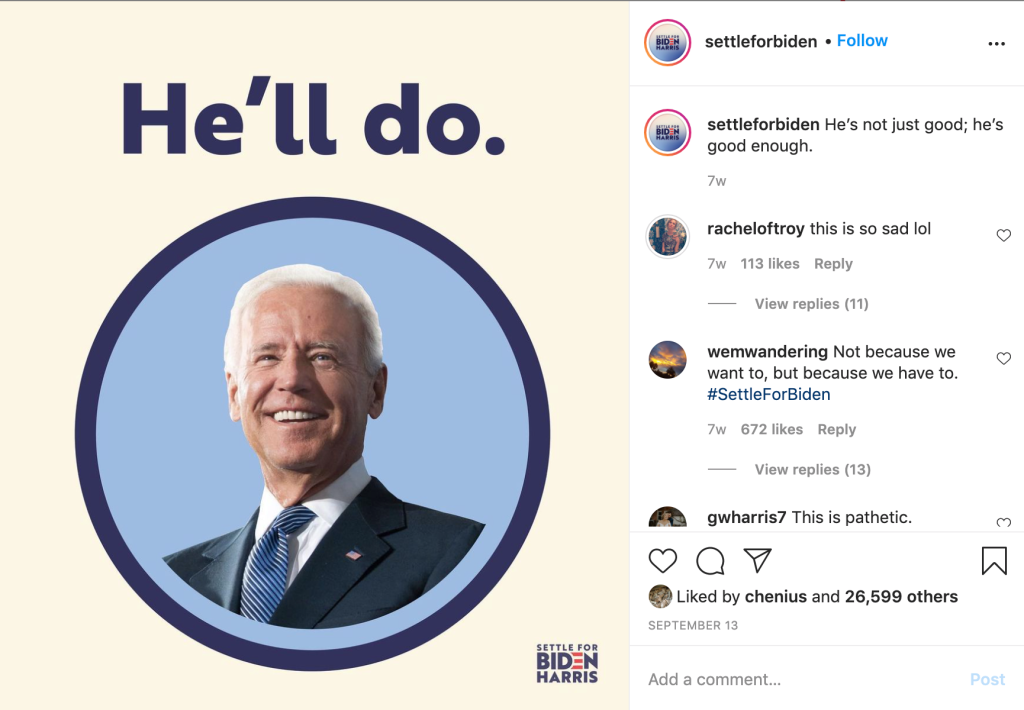
The concept blew up, and the account now has more than 277,000 followers, including public figures like actor Kerry Washington—and a team of young people working on it.
Fortune spoke with Weinberg, who is currently taking time off from school to focus on the campaign from his home in Chicago.
The following conversation has been lightly edited.
Fortune: How serious are you about Settle for Biden? And what does settling for Biden look like?
Weinberg: Well, we’re serious about settling for Biden. The way that we’re trying to communicate that is a little bit more sardonic. It’s tricky because we do use a combination of sardonic humor and substantive policy proposals to communicate our message. But no, we are not satire. Although, you know, there are elements that could be seen as satirical.
How did this movement start? What are the origins?
In April, right after Bernie Sanders dropped out, as the primaries were coming to a close, I saw people, online and in some of my personal circles, saying stuff like, “I don’t think I’ll be able to bring myself to vote for Joe Biden.” People were saying they just wouldn’t vote. And I saw people saying stuff like, “Joe Biden and Donald Trump are two sides of the same coin,” and on a personal level, that really incensed me. And on a policy level, I think it’s just incredibly inaccurate. So I decided I would spend a little bit of my time trying to defeat that narrative.
It started as just an Instagram account. It was just me from April until late June. I taught myself the basics of some graphic design software. It was basically just something that I was doing if I had a spare 20 minutes a few times a week, then it really, really took off. I put out a call for resumes. And now we’re a grassroots collective of two dozen young people across the U.S. just really, really working to try to defeat Donald Trump.
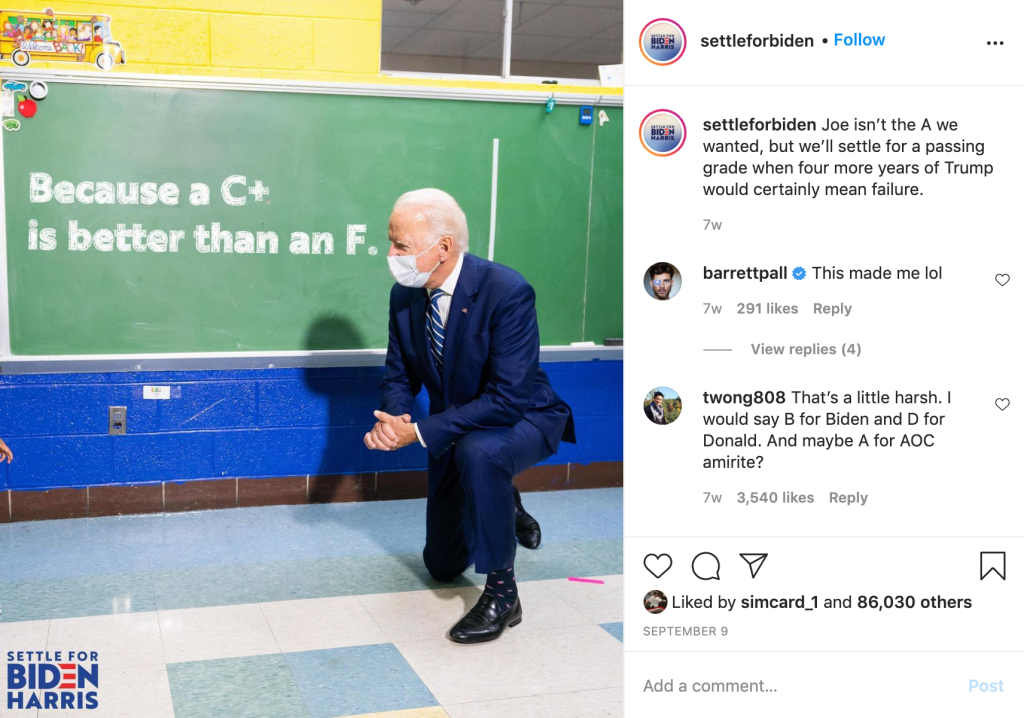
What do you mean by young people?
I’m 19; the youngest person involved is 17. With a few exceptions, we’re all college-aged or recent graduates.
Clearly you’re someone who’s interested in politics, but do you have a history of getting involved?
I don’t have any political experience or anything. I guess I just fell into the category of concerned citizen. Now I’m working 10 to 15 hours a day on Settle for Biden and some other related projects.
This project blew up really quickly. Now you’ve got celebrities involved, nearly 300,000 followers, merchandise… Were you expecting any of this?
I did not expect it to be this large. I’m really glad that it is. I’m glad that we’re having an impact. The scaling up was really due to just two or three posts that got a whole lot of traction. On June 27, there was a post which said “A vote for a third party is a vote for Donald Trump, and a vote for Donald Trump is a vote for homophobia, misogyny, facism,”—something like that. That got 25,000 likes when all the previous posts had been getting a few hundred. The growth streak was gradual up until then. The announcement of Kamala Harris as vice president also boosted us up.
It seems like you’ve tapped into something that many young people are feeling…
Yeah, that’s a thing we hear pretty commonly. I know a lot of people are not too inspired by Joe Biden, but they’re still gonna be voting for him just because he is clearly the best choice.
Voter enthusiasm is obviously an important factor in getting people out to the polls, but this is almost the opposite of ginning up enthusiasm. Do you worry that people won’t go out and vote?
Well, there are three factors at play here. The first is that there are people who are enthusiastic about Joe Biden—obviously, that’s not our base.
The second thing is we’re really trying to defeat this idea that you have to be enthusiastic about candidates to vote for them. If people are seeing stuff all over the place on TV, online, wherever, where people are completely and uncritically proclaiming their love for a candidate, then it’s easy to throw out the whole process and say, “I don’t feel this way about the candidate, so there’s no point in voting.” We’re trying to make the point that you don’t have to feel a huge sense of anything about Joe Biden; you just have to get out there and vote because our democracy is at stake. Hopefully, people will realize that they don’t have to be head over heels for him, but they can just spend five minutes filling out their ballot and get it over with, and then spend the next four years not having to worry about what the President did that day.
The third aspect is that there is a lot of passion in the opposite direction in terms of hatred for Trump. I’ve been hearing a lot of pundits say “you can’t just be voting against someone; you’ve got to be voting for someone.” I’m not sure that’s the case in this election. I think that the disdain and the frustrations around Trump and his administration are so intense and so justified that people are really going to be voting against him more than they will be voting for Joe Biden.
There’s that old cliche, Democrats fall in love and Republicans fall in line… It seems like this election may be the reverse of that.
There needs to be a combination on the left of falling in love and falling in line. People who supported Bernie Sanders, Elizabeth Warren—they fell in love. And for those people, their love did not translate into victory, and they have to fall in line. I would rather be the party that falls in love rather than falls in line because clearly the Republicans have blindly coalesced around Trump. I would not want to be that party. I wouldn’t want to be the party that falls in line around a psychotic megalomaniac. I’d rather be in the party that’s morally pure. But at the same time, moral purity is not going to win this election.
What’s the ideal outcome of this election for you? Would you like Biden to be a one-term president?
Right now my expectation is that Biden will be a one-term President. Based on what I’ve read and seen and heard about him and how he feels about the election, he probably is thinking along similar lines. He’s described himself as someone who’s going to restore the soul of the nation, a sort of a transition after Trump. And he’s also very old. The implication is that if he wins, then in four years, Kamala Harris will be the nominee. I don’t know how I feel about that, but four years is a long way away, and we have a tendency in the U.S. where on Nov. 4 or whenever Trump is forced to concede, if that happens, the media is just going to jump to 2024.
There’s a lot happening between then and now. I have no expectations about the election in four years. I just hope that someone progressive runs and wins. In terms of more immediate goals, we’re focused on getting as many people to vote as possible. We’re focused on pushing Biden’s platform to the left: We would love him to embrace Medicare For All and the Green New Deal.
You’ve worked with some celebrities. Have you heard from any politicians that you admire?
I exchanged a few emails with Noam Chomsky. We kind of quipped a little bit about how ridiculous it is that some people are going to be voting third party.
More from Fortune’s special report on what business needs from the 2020 election:
- What voters need from the 2020 election: Common ground
- What business needs from the 2020 election
- What Wall Street needs from the 2020 election
- What unemployed Americans need from the 2020 election
- What small-business owners need from the 2020 election
- What restaurants need from the 2020 election
- What unions need from the 2020 election
- What Silicon Valley needs from the 2020 election
- What unbanked Americans need from the 2020 election
- What low-wage workers need from the 2020 election
- What working parents need from the 2020 election
- What the health care industry needs from the 2020 election


